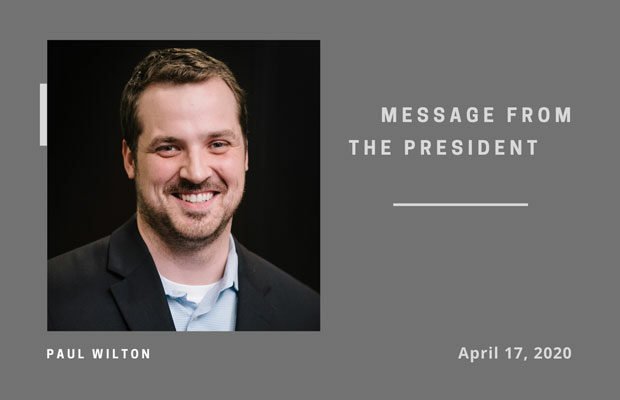Message from CHS President, Paul Wilton

With every challenge comes opportunity. Imagine if we had set out to make all the changes the world has made in the past month. Transitioning workplaces and schools to remote work and learning would have taken years, but somehow, we have adapted to urgent needs. In time, some of these changes will revert to the old ways, but other changes will last because we have found a better way.
The Canadian Hemophilia Society (CHS) has adapted too; we continually monitor the latest developments in the COVID-19 crisis and update our community. In contact with product manufacturers and the World Federation of Hemophilia, the CHS watches global supply levels for treatment products. We work with bleeding disorder treatment centres to communicate potential impacts on care and the best ways for patients to stay informed. As a result of our work with partner patient organizations, Héma-Québec has launched a home treatment delivery system so that our most vulnerable patients can avoid hospital visits. We continue to press Canadian Blood Services for a similar system in the rest of Canada. We distribute communiqués with guidance on questions patients have asked us about care. During social distancing, some may be inclined not to keep their appointments to donate blood, platelets and plasma. We call on our community to remind their networks that donations are critical for patients.
Over the next few months, the CHS will engage our community to inform our goal setting for the next five years. We encourage you to let us know what goals the CHS should work towards, what we should continue to focus on and how we can serve you better. We commit to undertaking a broad consultation process with several opportunities for community input. Let’s be open-minded, ambitious and creative in setting our goals. Just as we have adapted to COVID-19 with urgency, we can quickly transform the CHS to help us better serve our community.
Uncertainty creates fear for all of us, but we can be inspired by the courage and selflessness demonstrated by others. Thank you to health care providers who expose themselves and their families to risk taking care of others. Thank you to those in our community who follow public health guidelines to help bend the curve. Thank you to community members who have reached out and asked questions to help ensure that our bleeding disorder community continues to get the support they need. Thank you to our national and provincial staff and volunteers who have adapted to working remotely and continue to serve our community in new ways.
We remain committed to serving and communicating with you. Please feel free to contact us with any questions or concerns.
Very best,
Paul




